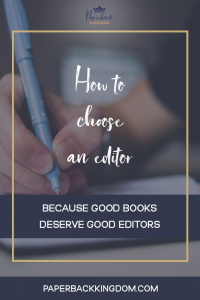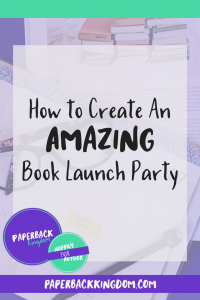So you’ve finished writing what feels like the millionth draft of your book, and you finally feel like it’s good enough to take to the next level: professional editing.
Finding an editor for your novel is a big (but crucial) step! I can’t stress how important it is to have an editor go through your work, no matter how good of a proofreader you might be yourself.
(And yes, I know I’ve said it a thousand times before, but just in case you’re new around here- if you can’t afford an editor, you can’t afford to publish. But seeing as you’ve found your way to this article, I’m guessing that ain’t you, right?)
First thing’s first before we dive into editor hunting-let’s take a look at what kinds of editing actually exist.
Types Of Editors:
Most traditionally published novels go through multiple rounds of editing to get them to industry standard.
Now, not every novel is going to need multiple rounds, and not every author can afford that either-so if you’re limited to one editor, it’s important that you find the very best editor for what your book needs:
The Developmental Editor:
Developmental editors are people who work on the novel as a whole-focusing on the structure of the book and making sure everything is consistent overall. Things like plot holes and inconsistencies, flat characters, and unnecessary scenes are the kinds of things a developmental editor might look at.
*If you plan to get multiple rounds of editing, always do this one first. Otherwise, if you start with any kind of grammar editing and then go back to make huge developmental changes, you’ll end up having to do the grammar editing twice.
The Line Editor:
A line editor is what I consider to be (in my personal opinion) a very luxury standard of editing. Line editors focus on ensuring every single line reads smoothly and clearly. All things considered, this is important for readability (and we are selling our books to readers, after all, so…)
However, when it comes down to grammar and story development, I personally think line editors are the least important if you’re on a tight budget.
That being said… I do recommended them if English (or whatever language you’re writing in) isn’t your first language, because it’s more likely you’ll have written sentences slightly incorrect with broken English. This isn’t something to be ashamed of because English is freaking difficult to learn-there are so many exceptions and rules that it’s a wonder anyone can learn English as a second language. But in terms of readability when putting words into a ‘product format’ (e.g. a book you intend to sell), it really does make a big difference to at least have the basic structure of your sentences read coherently.
The Copy Editor:
This is my top recommended editor for all writers, period. Copy editors are the ones who focus on grammar, word-usage and punctuation, and thank goodness these people exist.
Writing may be our thing, but we all make mistakes-and I certainly don’t trust myself to pick up on typos. My job is just to tell the story, thank you very much.
If you have a limited budget, and you’re fairly confident with the way your story has developed over time, then I recommended bypassing the other editors and hiring a copy editor. You’d want to be reaaaaaaaaally freaking good at proofreading if you plan to hire any other editor instead, and just that editor alone.
The Proofreader:
A proofreader is, again, someone who completes one of those luxury standards of editing tasks. In all honesty, you could probably do the proofreading yourself with enough patience, and I would recommend it.
A proofreader just goes through to ensure there are no typos, repeated words or formatting inconsistencies after all the other rounds of editing have been completed.
You’ll probably want to order a proof of your book and go through that anyway, so you could really consider this form of editing and that stage of the publishing process the same thing.
The Critique Partner:
The critique partner isn’t really a type of editor… but I wanted to mention them because I know writers can consider them ‘good enough’ when it comes to getting editing done.
Now, I’m not saying that critique partners are not great people to have on your team, but they definitely don’t match up to the standard of a professional editor who does it for a living. An editor most likely has a degree, and they are certainly charging the right amount for the kind of work and skill that goes into ensuring your novel is perfectly polished.
Critique partners generally work for free, and that says a lot about the standard of work you’ll be getting from them.
The other reason I wanted to mention them is because sometimes (and I mean sometimes), a critique partner can be a good substitute for a developmental editor. At least in the early stages of your writing career, so that you can put the big bucks towards a copy editor without skimping on quality for the development of your story.
I like to think of critique partners as developmental-editors-in-training because it’s the same kind of skill set that they use when giving you feedback, but just on a different level of professionalism and experience.
(As a side note, if you’re interested in getting into developmental editing, critiquing manuscripts can be a great starting point to get some hands-on experience in your spare time).
Choosing Your Editor
Now that you know what type of editor you’re looking for, it’s time to narrow down on who is the best fit to work with you. Here are some things you’ll want to be looking for:
1.) Their Track Record
Take a look and see if the editor you’re scoping out has a list of books they’ve previously worked on. That kind of thing can say a lot about how good an editor is, and what kinds of novels they are best at focusing on.
If the editor has a list of fantasy titles, and your book is a thriller, it would be a good idea to ask them first how they would go editing a thriller book.
Likewise, if you look up a book on their list and it’s got raving reviews, that’s a pretty good sign that the editor did a good job.
2.) If They Offer Trial Edits
Every editor should offer trial edits-and if they don’t, they’d better have a good reason why not.
Trial edits aren’t for fun-they’re meant to help you get a sense of whether the editor is a good fit for you (and vice-versa).
Don’t expect the editor to go all out and edit a couple of chapters for free, either-a trial edit should just be long enough that you can see their style and get a feel for the suggestions they make.
Also, when it comes to payment-you should only be paying once you agree to work together and on the agreed terms laid out in the contract between you and your editor.
3.) How You Heard of Them
You can find editors pretty easily by searching on YouTube (many have their own channels), in Facebook Groups and for editor’s Facebook Pages, on Twitter and on Instagram too.
However, pay attention to any editors you hear about outside of your search. Maybe a writer you connected with recommends an editor they’ve worked with, or you stumble across a great review for an editor. These are the kinds of rave-review editors you’ll want to go looking for, because known industry editors are most often worth the praise they get.
To help you get started on your search for editors, here’s some personal recommendations:
- RaeAnne (Lavender Prose) - affordable developmental editing and proofreading
- Adrienne (I A.M. Editing Ink) - offers a range of professional editing services and is super lovely to work with
- Amy Fonarow (Setting Things Write) - a fantastic and easy to work with grammar editor
- Allison Rose (Purple Rose Proofing) - specialises in proofreading and fantasy fiction
- Loni Crittenden (Crit And Pen) - specialises in spec fiction and developmental editing
- Susan Whittaker (A Way With Words Proofreading) - specialises in proofreading
- Naomi Lastrucci - specialises in proofreading

Written by Pagan Malcolm
Pagan is a copywriter and business coach helping writers understand the business side of publishing so that they can become serious authors.
| Facebook Group | Instagram | Podcast | Website | Blog |

